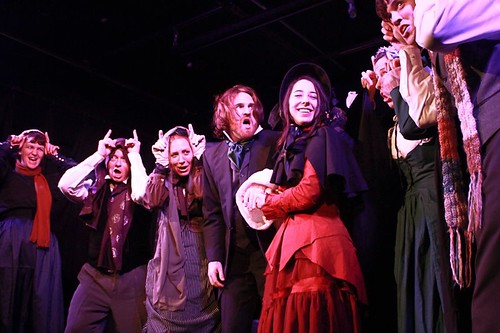
By Kaci Beeler
As an actor I’ve auditioned for countless plays, films, commercials, and improv shows. I’ve also been on the other side of the process and have held and watched auditions for several years now. Being on both sides of the situation has given me some insight that I’d like to share with aspiring actors and improvisers looking to book a part in an ensemble improv show.
At The Hideout Theatre, we hold auditions for our Mainstage productions 6 times a year, in addition to occasional auditions for other shows like the Flying Theater Machine (our improv show for kids) and Pick Your Own Path.
We have no prerequisites for auditions. Absolutely anyone can come and audition for a slot in our shows. That said, we are often looking for actors with specific skills who can improvise. For our Mainstage shows we have a limited time frame in which to mount the show, and our directors like to be able to hit the ground running. This isn’t said to be discouraging, it’s just the truth of the situation. Most of our shows have a mix of experienced performers and newer performers that we feel have potential.
Auditioning is a skill, and there are things you can do to make your experience easier and more fun for everyone involved.
Preparation
Before signing up for an audition, make sure to check your personal calendar to see if you can actually commit to the rehearsal and show dates. If you’re not available for a large majority of the dates, it’s unlikely you’ll get cast, and you should probably consider waiting to audition when your schedule is more flexible or open. When an actor drops out of a production after getting cast, it looks bad. No one wants to work with a flake, no matter how good they are, plain and simple.
Thoroughly read and re-read the audition notice. Does the call mention certain source materials or inspirations to look at? Is the director looking for certain skills? Do your research. If you’re auditioning for improvised Shakespeare, for instance, it would be a good idea to actually read some Shakespeare, watch some films or a play, and really get a feel for the subject. At worst, you’ll learn something. You might even learn you don’t like the source material…in which case, you might not want to audition for the production after all. Just because the show is improvised doesn’t mean that you shouldn’t be prepared. Some people are very good at winging it, but those people are few and far between. For the rest of us, it’s nice to at least have an idea of the style and tone we might be portraying in case the director wants to see it.
Punctuality

Charles Dickens Unleashed, 2011.
Show up on time for your audition slot, or better yet, early (sometimes there is paperwork to fill out). When it’s your audition time, be ready to go. Make sure to eat your sandwich or snack beforehand and have everything in order.
Presentation
When coming into an audition room, play it cool. Be friendly, but not loud and boisterous. The manic energy in a group improv audition can be infectious and fun, but it’s rarely going to help you stand out in a positive way. Save the squeals with friends for later and focus on listening to the director. They’ll usually tell you exactly what they want to see happen.
Speak loudly and clearly. This is HUGE. HUGE!! If you can’t be heard, you might as well not be in the room. Stage work requires projection and speaking in a normal volume is not enough. Our downstairs theater at The Hideout in particular is a space that absolutely requires our improvisers to project loudly and clearly all the way to the back wall during a performance. A director can always believe that you will be able to speak more softly, so speak loudly and clearly (no muttering unless it’s intentional) from the beginning.
Be a team player. The director is often looking for someone who plays well with others. Even if an improviser is the funniest person in the room, if they ignore and step on every scene partner they work with, it’s unlikely they’ll get cast. Improv relies on a strong ensemble and listening and leaving space for others is just as important as taking the stage yourself.

Photo by Steve Rogers.
That said, take your time to shine. We want team players but we also want improvisers who will claim the stage when it’s their time to shine and be the star. Are you delivering a monologue? Plant your feet, be bold and speak out! Take risks! If you’re a part of a group of people onstage working together, make sure you actually get out onstage. If you don’t go out onstage in an audition, how do we know you will in the show? A hesitant improviser can be as much of a detriment to an ensemble piece as a showboat.
How do you act as a team player AND a star? Pay attention to what’s going on around you. If you haven’t spoken in awhile and you are inspired by an idea – put it out there. Make it happen! If you’ve been putting a lot out there and making a lot happen, it might be good to reign it in and pull back for a little while and give someone else a chance. Better yet – set someone else up for success.
Confidence & Calm
Don’t apologize. Have you ever heard the phrase, “Fake it until you make it?” It’s a good one. Most people in this world are faking that they know what they are doing. You can also be one of those people, especially in improv where everything is pretend!
Everyone is a little shy, a little nervous, and a little self-conscious. At an audition, absolutely everyone is a bit anxious – even the director. It’s okay if you feel that way. It’s normal. Don’t let this feeling get in the way of your work. Don’t e-mail a director after an audition to tell them that you had a bad day so you were in your head during the audition, it won’t help. If you think you were in a weird or bad scene, just try to have fun and ride it on through. Failure and weirdness is a part of improv. It’s something to embrace, not fear. Directors know this, don’t worry. In improv auditions, we’re looking for how improvisers deal with perceived failures and hiccups.
I personally find that a mantra helps me when I feel apprehensive and anxious. I repeat it in my head whenever I felt a little bout of panic set in when I’m put on the spot and feel watched. For example: “The moment that is happening right now is the right moment.” I like that mantra because it reminds me that there is something perfect and unchangeable about the present moment. The people. The place. The energy. It’s all something to work *with* not against. Let go of expectations. They don’t really serve you. Make eye contact with your scene partners. Don’t be afraid to ask questions if you’re actually confused. Have fun with what you have right in front of you. Life’s too short to not enjoy your pursuits. Enjoy the process.
Another mantra I like is, “How fascinating!” Feel yourself thrown off by someone else’s actions? “How fascinating!” that is. Now you have an opportunity to really improvise and try something new.

Flexibility
A director is often looking to see a range of abilities within one audition. I don’t mean that everyone should change voices or characters every 3 seconds, but being able to take direction is of huge importance to the theatrical process of putting up a new production. If a director asks you or your group to try a specific approach, like, “quick, fast-paced scenes” or “slow, patient moments” or even, “acted as serious as possible”, it is to your advantage to do your best to execute the direction. Slow down if asked. Try an accent or character if the direction is suggested. Even if you think you have a better idea, or a funnier idea, the director is looking for something else in that moment. If you don’t understand the director’s notes or set-up, you can always ask for clarification. If you don’t like the director’s ideas and don’t want to follow their advice, then this production is probably not for you (and it’s better to know this early instead of later for all parties involved)!

Compassion
Imagine you have to sit in a room for 3 hours and watch 60 different people, many of whom you know and like, vie for a part in a piece you care a lot about. Imagine that you have to pick only 10-12 of them to be in your show, even though at least 40 of them could do a good job in it. A director’s role in a production is not an easy one. Sometimes it’s a matter of numbers. Often, 40 people can’t be in one show. Sometimes it’s a matter of playing style. Maybe the director is looking to work with improvisers who bring a certain skill-set to the table. Whatever their decision, it wasn’t an easy one. Don’t take auditions too personally. The more you enjoy the process, the less painful all aspects of it will be.
If you want to know how your audition looked from the outside, most directors are cool with giving personal feedback BUT it’s best to wait several days after the audition before asking this of any director.
The more often you audition, the better you will get at it! It’s a skill, just like anything else, and it’s something you can work on.
Break a leg!
*If you’d like to know about our upcoming auditions hover over the “classes” tab above and click on “auditions” from the drop-down menu.

Comments
4 responses to “Improv Audition Techniques and Tips”
Love this. All good advice, especially remembering the difficult job of directing. Thanks for writing.
Super helpful. I am an Acting major, and I am auditioning for an improv troupe tonight. Thank you for the advice!
Awesome information. Going to utilize them in next improv class. Thank you!
My son has been wanting to get into acting and I haven’t been sure how to handle everything for him. I liked that you had mentioned that it can be important to have confidence in everything to make sure you’re giving everything your best. I’ll have to start looking around at improv classes in the area, and I’m hoping that I’ll be able to find one that works for him!